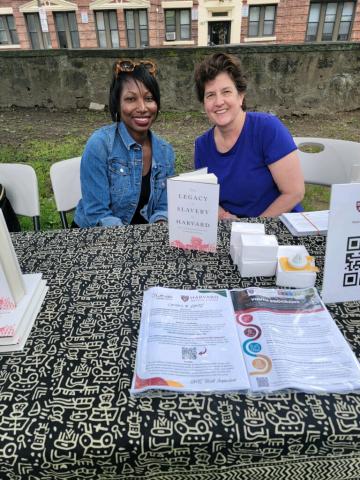
On Monday, June 19, Harvard tabled at the 13th annual Juneteenth Emancipation Observance in Roxbury, organized by the Boston Juneteenth Committee and National Center of Afro-American Artists. Featuring food, music, a parade, and activities for all ages, the event had over 500 attendees.
Representatives from DICP and the Legacy of Slavery Initiative at Harvard attended to share youth programming opportunities and other future community investments. Building on current efforts as well as expanding new outreach plans were discussed.
Explore the memories, plans, and hopes of Juneteenth with members of the Harvard community.
History of Juneteenth
It goes by many names. Emancipation Day, Freedom Day or the country's second Independence Day, Juneteenth is one of the most important anniversaries in the nation's history.
On June 19, 1865, Major General Gordon Granger, who had fought for the Union, led a force of soldiers to Galveston, Texas, to deliver a very important message: The war was finally over, the Union had won, and it now had the manpower to enforce the end of slavery.
The announcement came two months after the effective conclusion of the Civil War, and even longer since President Abraham Lincoln had first signed the Emancipation Proclamation, but many enslaved Black people in Texas still were not free, even after that day.
Juneteenth gets its name from combining "June" and "nineteenth," the day that Granger arrived in Galveston, bearing a message of freedom for the slaves there.
Upon his arrival, he read out General Order Number Three, informing the residents that slavery would no longer be tolerated and that all slaves were now free and would henceforth be treated as hired workers if they chose to remain on the plantations, according to the National Museum of African American History and Culture.
"The people of Texas are informed that in accordance with a Proclamation from the Executive of the United States, all slaves are free. This involves an absolute equality of rights and rights of property between former masters and slaves, and the connection heretofore existing between them becomes that between employer and hired laborer," the order reads, in part.
Texans celebrated Juneteenth beginning in 1866 with community-centric events, such as parades, cookouts, prayer gatherings, historical and cultural readings, and musical performances. As families emigrated from Texas to other parts of the United States, they carried Juneteenth celebrations with them. On January 1, 1980, Juneteenth officially became a Texas state holiday. Al Edwards, a freshman state representative, put forward the bill, H.B. 1016, making Texas the first state to grant this emancipation celebration. Since then, the federal government, all fifty states and the District of Columbia have commemorated or recognized the day.
- Log in to post comments
